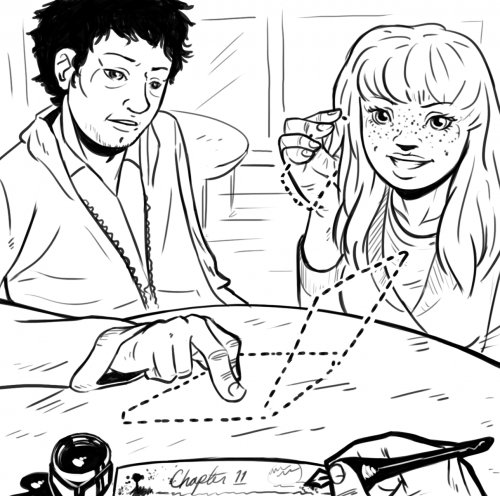I was sitting at a café table in The New School’s dining room eating an oatmeal currant scone with a perfectly paired Starbuck’s coffee. I was lucky to find a table for a few hours. The wrap around windows let in the afternoon sun, and my cul-de-sac corner ensured a space free of ambient sound, ideal for focusing on my novel.

The room was filling with New School students who did not so much gather as accumulate. They arrived to eat a quick lunch before heading off to class. I watched their dexterity on laptops as they browsed the web and checked their smart phones. They ate, drank and text messaged friends while their fingers poked and prodded their hi-tech toys. I looked around. To my surprise clusters of students were all multi-tasking in the same way: some eating, drinking and texting while others did all three as they chattered on phones balanced between nape and neck. These were signs of agility but they also supported Eliot’s observation that “we are distracted from distraction by distraction.”
I turned back to my novel. In contrast to the tables nearby mine was free of technology. On display were sheets of paper and a fountain pen. I filled the pen’s reservoir from a bottle of crimson ink; it caught the afternoon light and seemed to flash red alert. Two students stopped to watch my pen ritual. My smile invited their reactions.
“I’ve never seen anyone do that,” he said.
“That’s so cool,” she added, using the word that affirms high regard and complete approval.
“You sit in the dining room every day,” he continued. “Do you teach here?”
“No. I help students choose wisely so they don’t make expensive mistakes.”
“You’re a New School alumnus?” she asked
“No, but I am a lifetime member of the Alumni Association.”
“How is that possible?”
What follows is the reply I gave to her question.
When I returned last summer from Sicily after researching a thriller called “The Sign of the Archer,” a foot of mail greeted me. Most of it was good-natured trash but one letter caught my attention. It came from the New School’s director of alumni relations, Jessica Arnold. She welcomed me as a member and listed the amenities to which I now had access. An enclosed identity card announced a lifetime membership. My name followed along with words entitling me to all benefits.
Pleased but puzzled, I phoned Jessica to express my dilemma. After telling her who I was she asked:
“Did you get your membership card?”
“Yes. I called to say thank you.”
“Please take advantage of the benefits.”
“That’s why I’m calling. I’m not sure I can.”
“Why, is the name spelt incorrectly? We can issue another card.”
“No, my name is fine and so is the email address.”
There was a pause at her end. She had exhausted her choice of mishaps. I filled in the silence.
“Jessica, I’m not an alumnus of The New School.”
“How can that be? You’re name is on the list. We have you down as a Ph.D.”
“That’s correct, but mine isn’t from The New School.”
“Then how did your name get on our Ph.D list?”
“I don’t know. That’s why I phoned.”
“Do you have any idea?”
“Over a decade ago I offered a course on Buddhism. It was listed but it didn’t fly.”
“Why not?”
“It was under-subscribed.”
“Joseph, I think I would like to keep you on our list. Maybe there’s something you could do for us.”
“I did give the question some thought in case it came up. I would like to sit in the dining room and work on my latest book. Should the opportunity arise for students to join me, I’ll offer them something they don’t get much of… something they don’t seem to give one another.”
“What?”
“A good conversation.”
“How would you describe it?”
“One that has range and concentration. If they join the circle, they’ll find themselves involved in nothing less than everything. What’s round has no beginning or end. I’ll warn them to be ready for the works.”
Such was my reply about becoming part of the Alumni Association and what I offered for the privilege. The student in the cafeteria continued the inquiry.
“How do Mark and I join you for conversation?” Sarah asked. By now we had moved to first names.
“Anyone can join the Lunch Club. There’s one condition.”
“What’s that?”
“You have to turn off technology.”
“All of it?”
“Yes. No smart phone, Blackberry, laptop, Kindle, iPad or iPod. Imagine you’re at the movies unplugged. The only thing turned on is yourself. You’ll be so involved in the conversation you won’t even check your watch. I’ll have to remind you of class.”
“Why can’t we do both?”
“You mean stay actively on line and engaged in conversation. Well, I don’t want a hundred per cent of your divided attention. I want you totally present.”
“But what’s in it for us?”
“Serious fun. It’s the only reason for learning anything: to be instructed and at the same time entertained. I’m offering you the Classical Ideal by way of conversation. Are you game?”
“Yeah.”
“Try saying yes. You’ll feel more invested.”
“Yes.”
“How did it feel? A little funny?”
“Yes. But also serious.”
“We’re on our way.”
Joseph Roccasalvo is a professional writer. His website is www.josephroccasalvo.com
Joseph Roccasalvo is a professional writer.







Leave a Reply